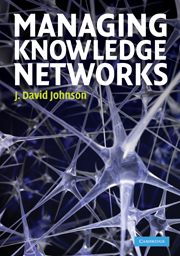Book contents
4 - Context
Published online by Cambridge University Press: 05 June 2012
Summary
…we don't know who discovered water, [but] it was almost certainly not a fish.
(McLuhan, quoted in Lukasiewicz 1994, p. xx)Despite repeated appeals for contextual inquiry and sensitivity to context…no one is exactly sure what is being requested or how to produce it.
(Weick 1983, p. 27)The more contexts two people share, the closer they are, and the more likely they are to be connected.
(Watts 2003, p. 126)Information is united with context, that is, it only has utility within the context.
(Grover and Davenport 2001, p. 6)A fundamental necessity of social action is that it must occur within a context. While context is central to all explanations of social science, it has been examined most often in micro, discourse-related processes or situational semantics. Knowledge is inherently embedded in particular social situations (Birkinshaw, Nobel, and Ridderstrale 2002). The relationship between context and information seeking is a problem increasingly viewed as the central issue in information behavior research (Cool 2001; Dervin 1997, 2003; Johnson 2003; Pettigrew, Fidel, and Bruce 2001; Talja, Keso, and Pietilainen 1999; Taylor 1986).
Generally, the persistent theoretical problem of accounting for individual action in a social context is seldom explicitly addressed and we are unaware of the different senses of “context” in use (Dervin 1997). Especially lacking is the identification of “active” ingredients of the environment that trigger changes in KN (Johnson 2003).
- Type
- Chapter
- Information
- Managing Knowledge Networks , pp. 57 - 78Publisher: Cambridge University PressPrint publication year: 2009



